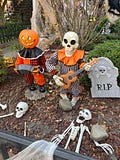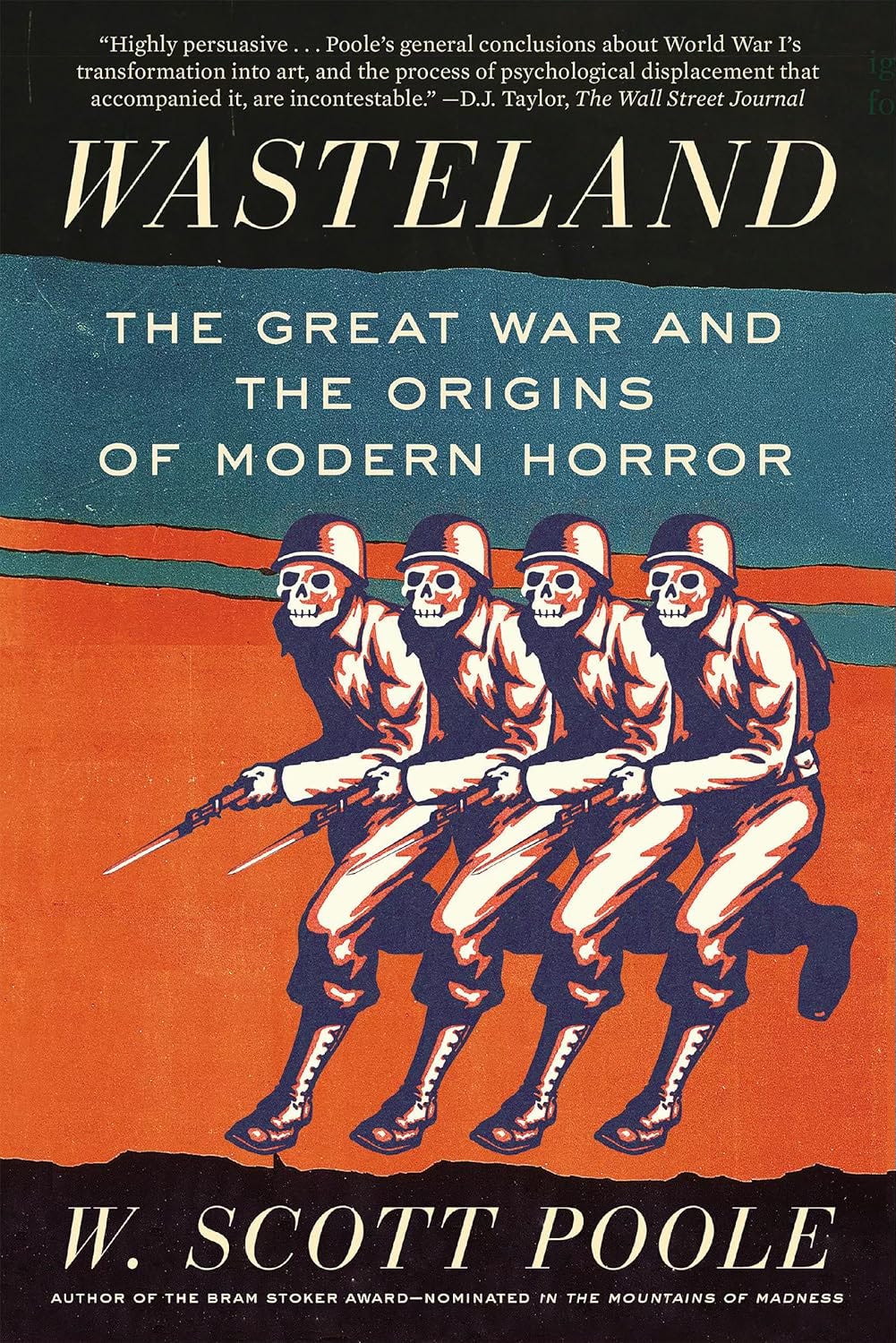American Horror Story
"You've felt it your entire life, that there's something wrong with the world. You don't know what it is, but it's there, like a splinter in your mind, driving you mad."
What are you watching tonight? It’s Halloween, and when the sun goes down, most of us are going to turn on the TV, fire up something classic like Nosferatu or Night of the Living Dead or Halloween itself, or maybe something new like The Substance or the new V/H/S movie (I’m going to be “that guy” and say that the first ones are much better and the last two have been pretty meh), Hereditary, the Argentinian movie Terrified (which I’ve been too scared to rewatch), or pay tribute to the late, great Terri Garr by screening Young Frankenstein?
Don’t stop there, though. Horror is part of a sensible, intelligent lifestyle, entertaining in myriad (personal) ways, and like developing a Brodskyian literary taste to defend against political propaganda, horror is the ideal training to endure and navigate contemporary American society. White audiences that have seen Jordan Peele’s movies likely at least sense this. For me, it was explicit emotionally and intellectually the first time I watched Night of the Living Dead, when I was a teenager.
(The movie is public domain so you can watch it anywhere, anytime with any internet access.)
As W. Scott Poole convincingly points out in his books, modern horror came out of WWI, and any immersion in the history of that war makes the point viscerally correct. Ghost stories and mysterious gothic tales like Dracula and even Frankenstein collided with industrial slaughter, the engineering of the machine gun and the tank and the science of poison gas, literally chewing thousand and thousands of bodies a day and spitting their fragments into an earth that had been blasted into a hellish moonscape, leaving many survivors themselves in fragments (if you know the horrific story in Dalton Trumbo’s Johnny Got His Gun, you know what I mean, and if you don’t know it I would caution you not to investigate because the idea is incredibly upsetting—and I can’t believe we were assigned this in high school English).
Wilfred Owen’s poetry is arguably the first modern horror fiction. Conjoined with the development of motion pictures, horror became one of the first modern genres, and it’s been dominated by film since after the war (the rise in horror fiction in the 21st century, and especially the last decade, is something Poole argues in the introduction to his Dark Carnivals: Modern Horror and the Origins of American Empire is inherent to our politics, and again this strikes me as absolutely correct).
This informative new article from horror writer Grady Hendrix outlines and affirms this, and together he and Poole show how we’re not just living in the long tail end of WWI but, socially and politically struggling to escape from an atavistic shambling horror that is specifically the antebellum American South. As Hendrix points out, “No matter how hard we try to forget it, no matter how deeply we bury it, the past always comes back. We cannot escape it. But that doesn’t stop us from trying.” Cue Faulkner: “The past is never dead. It's not even past.”
The past, ever undead, keeps slow-walking itself into the present. It’s the slow zombies, not the fast ones (which always feel like some kind of meaningless demonstration of irrelevant improvements in technology) that are terrifying. The right wing’s goal is a hierarchical oligarchy, a de facto aristocracy, that subjugates non-whites and women with state violence and keeps the rest poor while sucking wealth upward. Political journalists are whistling past the graveyard when they couch this as some kind of nostalgia for the 1950s.
What it is is a fucking horror show on the horizon, and showing it as it is shows that the best preparation for it, the best way to see it and act accordingly, isn’t to read newspapers that suck up to rich people or irrelevant academic policy books and memoirs that are only written for a small incestuous circle, but to watch Duane Jones fight off a horde of zombies and then be shot by a vigilante posse organized by the local sheriff. It’s not just an extraordinary movie, but a piece of contemporary Americana.
The Horrors Are Us
Horror is also a fantastic way to see how other people think of the world, and what is horrific in different cultures with different histories. There’s the fantastic movie El Conde, which shows Augusto Pinochet as not only a vampire but as the child of Margaret Thatcher, also a vampire. Mariana Enriquez’s superb and frightening recent novel Our Share of Night takes place during and after the fascist junta’s control of Argentina. As Pinochet and Thatcher sucked the life out of their countries, so do the privileged in Argentina “disappear” people, but for reasons that are far beyond political and that are terrifying.
We need to see the overall horrors of modern life, technology and what it allows and conveys to us and what it’s done to the world: the found-footage subgenre, Videodrome, The Signal—this one—the Facebook horror of Unfriended, the web-hosting horror of The Host (made entirely through Zoom during the 2020 pandemic), Dashcam, where the entire movie is through the view of the main character’s phone as she streams her evening, the frightening environmental horror of Take Shelter, the bourgeois social traps and horrors of Coherence and The Gift—this one—the series Deadwax, which is about deadly frequencies in music but is really about the horror of the insanity of obsessive vinyl collecting. All of these movies, even with their flaws, are more than worth seeing because they have important and vital ideas that you simply cannot find in standard dramas, and are often made with imagination and skill (because of tiny budgets) that are rather glorious and, like great genre work can, conjoin avant-garde and experimental art with popular entertainment (Skinamarink may not be great, but it’s the most experimental movie to appear in years). (When do we get the horror of the black plastic spatula?)
Sounds, Terrifying
And right on time, there’s a new release from Fossil Aerosol Mining Project:
This collective’s work is vital because by making audio collages from found media detritus, they're showing what the future might sound like to anyone who is left behind, alive or undead. They can’t help but be eerie.
Prepare thy eyes and minds and ears for the future. Good listening to all.
Final Countdown
The Kill Yr Idols new subscriber offer is coming to an end tonight, the final witching hour is midnight PST. All new yearly subscribers up to that time will be entered into a giveaway—run by random number draw tomorrow and posted in Notes—for the following recordings:
One subscriber will get a brand new copy of LIFETIME REBEL, the new 4CD/1DVD release from RogueArt of Joëlle Léandre’s full Lifetime Achievement concert from the 2023 Vision Festival (our longer review is here). It’s excellent, a best-of-year entry, superb free and creative jazz from the opening Tiger Trio with Nicole Mitchell and Myra Milford to Léandre’s duet with the great poet Fred Moten.
Two other subscribers will each get a brand new copy of the latest Can archival concert release, Live in Aston 1977. This is in the Bandcamp guide to Can and it’s the best so far of their new series of live albums:
Every new paid yearly subscriber (including current monthly subscribers switching to yearly) will have their name entered into the drawing per subscription—get/gift two subscriptions, you’re entered twice, etc.
Why subscribe? This is a 100% reader supported newsletter, and your support goes directly to my basic needs, this is an independent as it gets. If you’re wondering what you get out of a full subscription, this memo from the corporate office breaks it down for you. We’d love to have you aboard, we need to have you aboard!
Be safe for the holiday, make sure to check to see who’s ringing your doorbell tonight.




